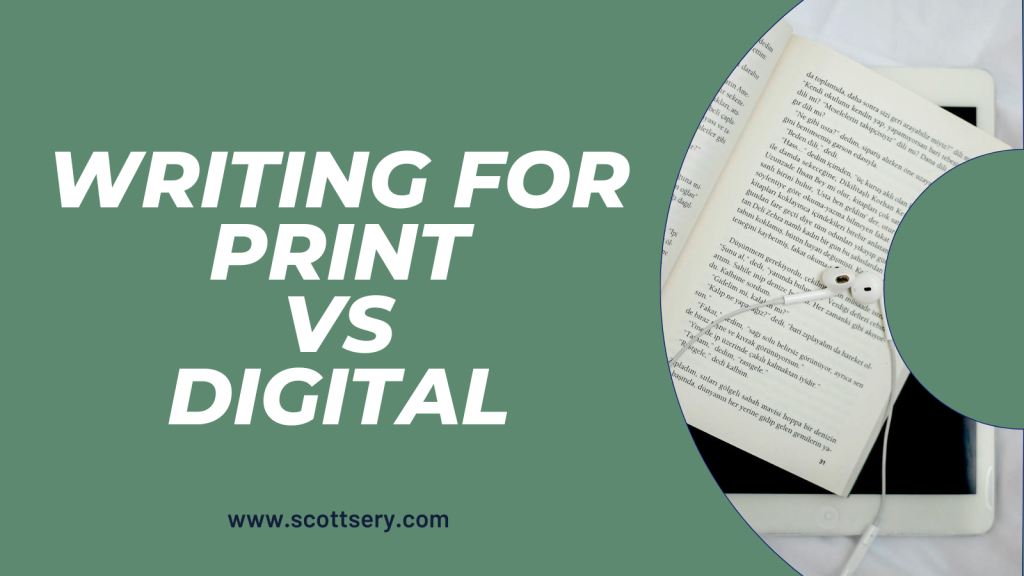
Different Publishing Mediums Require Different Techniques
When you sit down to write, there’s a lot that goes into the planning before you even type out the words. One of the biggest influencers on how you write is how that work is ultimately going to be published. Are you writing a book or are you writing a blog? Is your article going to be published in a magazine, a journal, or online? There’s even a bit of a difference between how you write for an eBook versus a print book (although both can end up being largely the same).
Let’s look at some of the nuances between writing for print and writing for digital.
Understanding Your Audience and Reading Habits
When you sit down to read a book or a magazine, have you noticed your reading habits are different than if you’re reading something online?
For the most part, readers will take more time when something is printed. They read each word carefully, complete the article or book, and absorb the information quite a bit better.
When there’s an article online, whether it’s a random blog like this one, or even an article on a news site, readers tend to skim a lot more. That is why, in part, online writing is broken up with line spaces between paragraphs, and uses headings to break up sections (the other reason is because when you’re optimizing for SEO, those things matter).
Before you write, you should know – are your readers going to really dive in and consume the information, or will they skim a lot of it and only read the parts that apply to them?
Structure and Formatting for Print v. Digital
With that in mind, you can figure out how you will structure and format your writing.
When you write something that will end up in print, you can put a bit more into the narrative. Longer paragraphs don’t look as bad in a book as they do on a screen. Let one paragraph lead into the next and create a nice flow rather than breaking things up by headings.
Digital writing, on the other hand, demands shorter paragraphs (especially if most people read on their phone). Long paragraphs on a small screen drag on FOR – EV – ER! Those headings and bullet points help to improve scanability and get your point across quickly.
Style and Tone When Writing
Print writing can tend to be more formal, while digital can have a little more leeway on how casual it is.
Immersive storytelling, especially when writing a book, lends to a better narrative. If you’re writing a book, you can draw that thing out considerably, and it often only gets better. You want your audience to be drawn in deeply.
Digital, on the other hand, can be more conversational and even include a bit of slang, ya know? It’s more concise, get to the point, and keyword conscious (such as optimizing for whatever you are all about, maybe something like how to write a book).
Magazine articles can fall in the middle, but tend toward the more formal writing, but conciseness of blogging.
Distribution and Longevity
Where your work will be found, and if it will last for years or days are key as well.
Print tends to last a little longer. Books, hopefully, will last longer than you do. If you write something that’s printed in a book, people might read it decades or centuries later. Your writing should consider that limited distribution range might be an issue, but also relevance many years from now must be considered.
Digital has a faster and more global reach (my analytics show visitors from all over the world – perhaps just bots, but if you’re popping in from outside the USA, leave a comment and say hello!). It updates instantly (and you can revise instantly and not worry about the blunder you made – good luck retracting that stuff in print). Because it’s all instant, you can write for now instead of something that will endure (although evergreen content is best).
Newspapers (what the heck are those?) and magazines will, again, be a bit in the middle.
Why You Need a Professional Writer
It’s not a one-size-fits all world. Writing for one magazine is entirely different than writing for another. Print often follows more rules, but some of the best books out there broke the fu-heck out of those rules (The Catcher in the Rye and A Clockwork Orange come to mind).
You need a professional writer to ensure you’re optimizing your writing based on where it’s going to be. Even different locales in the digital world need different nuances and structure.
Fortunately, I know a guy. Scott Sery is a professional writer. As a ghostwriter he can write your book, in your voice, and you get the credit as the author. As a writing teacher, he can guide you along when you wonder how to write a book.
Questions, comments, want to see what it would cost? Book a free 30-minute discovery call using the calendar below.
